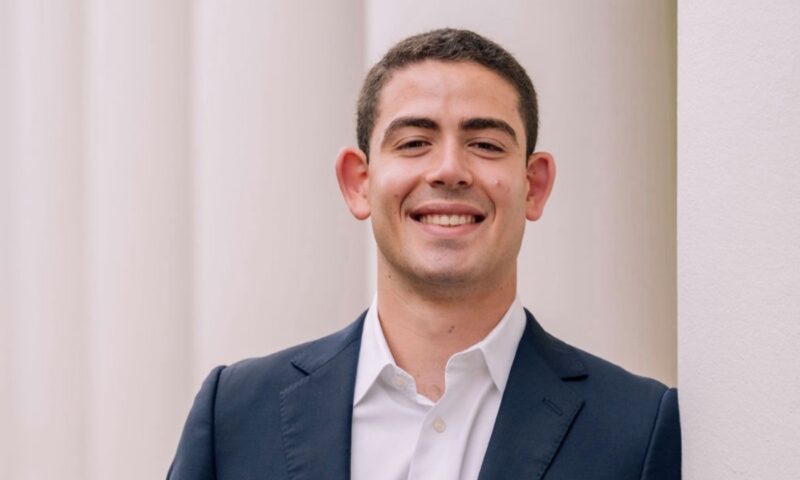Agriculture, specifically farming bananas, may just be one of the most atypical answers given by a McIntire student asked about their career ambitions. But for fourth-year Brianna Kamdoum, the superfruit offers a gateway to helping underserved populations struggling with food insecurity, especially in her family’s native country of Cameroon.
Kamdoum grew up in Northern Virginia in a tight-knit family. She’s the third of four children, with an older brother, an older sister, and a younger sister who is seven years her junior. “It was a really great childhood. My siblings and I are still very close with one another,” she says.
But it was her time spent on her uncle’s farm in Culpeper, VA, that sparked, and now fuels, her current career interests. “It was, and still is, a way for me to be able to connect with where my family is from,” she. “My family still does a lot of farming in Cameroon to this day, and being on my uncle’s farm allowed me to connect with them through agriculture.”
Ready to Go Bananas
While banana farming may seem like an unusual path for a business student, it makes complete sense to Kamdoum. She is concentrating in Finance and Information Technology at McIntire and is also pursuing a second major in Economics. Her goal is to bridge the gap between these areas within agriculture to help farmers domestically and abroad understand how to use technology to improve their operations.
Citing the Netherlands as an example, she says, “They are a country that is restricted because of how small they are land-wise. We in the United States haven’t necessarily been forced to actually grow things in a way that’s conducive and good for the environment because we are not limited by space. They’ve been able to leverage technology successfully in a way that it helps to supply and feed their whole population.”
Kamdoum could have looked to her familial farming roots in a diverse number of crops such as mangoes, pineapples, berries, peanuts, palm oil, and coffee, or to a more traditional approach raising livestock like her uncle. But she zeroed in on bananas after learning how banana production—or rather, a lack thereof—was a factor driving food insecurity among many African nations.
“A lot of land has been destroyed because of a disease that has spread called Fusarium wilt,” she explained. “As a result, the yellow Cavendish banana, the banana we typically eat, is actually becoming extinct. Researchers are trying to produce another banana breed that will survive, but that’s not going to address the major challenges that these communities and regions are facing.”
One challenge Kamdoum details is that of the banana crop that did manage to survive the disease: Too much of it is exported for economic purposes from the people who need them. “So, they themselves, the producers of these bananas, are not reaping the benefits. They’re exporting the bananas instead and then facing food insecurity.”
Historically, the banana has helped many communities to satisfy basic sustenance needs through its high nutritional value, specifically its vitamins and minerals that help prevent conditions such as anemia and high blood pressure. And, it has a low carbon footprint, making it an energy-efficient crop to grow.
“There are a lot of banana varieties that these countries can produce, but they don’t have a lot of market value overseas. I want to work with banana farmers to figure out how they can gain monetarily but also solve their food-insecurity issues as well,” she says.
Charting Her Own Path
As Kamdoum prepares for her last few weeks on Grounds, she’s excited for the future. She plans to find work with a venture capital firm that specializes in agriculture, hopes to be accepted into a graduate program at Cornell University, and is prepared to soak up all of the knowledge she will need to one day build her own banana startup. “That’s the plan for the next five years, anyway,” she says with a laugh.
And though that journey will likely come with its own set of challenges, Kamdoum has had the type of experiences that have equipped her to overcome them.
As a first-generation child of immigrants, Kamdoum grew up in a home that spoke three languages—English, French, and Baham—and where there was always something delicious coming out of the kitchen. Her mother was a nurse, and her father worked in the hotel industry before pivoting into farming. Kamdoum spent idyllic breaks from school and summers on her uncle’s farm, tending to livestock, feeding chickens, and mending fences.
When it came to choosing a college and which subject to study, her parents offered particularly traditional guidance.
“I got into the University of Virginia, and I knew the only thing I would want to do would be to go to the Comm School,” she says, noting that her parents had a different path in mind for her. “Because both my parents are immigrants, their belief was to be successful in the U.S., you need to be in the medical industry.”
Kamdoum explained to her parents that she was all in on Comm. Though they may not have initially agreed with her decision, they supported her.
“It wasn’t the most exciting thing for them to hear. But I’ve shown them you can do a lot with whatever cards you’re dealt and make something of yourself. I’ve also taught them that your path to success isn’t defined by a norm or standard,” she says.
UVA has provided Kamdoum with ample opportunities to learn both about herself and what she wants to do professionally. It’s also allowed her to explore new passions like travel. She spent J-term in Kenya, and the experience was life defining.
“It was my first time in East Africa. It was nice to see the culture and people there. It’s a really beautiful place. I want to go back and bring my family with me,” she says. “A big takeaway from that trip was that I want to travel more. My top three destinations are Japan, Netherlands, and Iceland.”
An Advocate for the Underserved
McIntire has certainly defined a great deal of Kamdoum’s university experience, but her inquisitive nature and perceptiveness have influenced her involvement in other activities outside of the classroom. She currently serves as the Vice President and Special Events Chair for the Black Commerce Student Network, a group she says is open to all students who are interested, curious, and want to learn more about their business focus and networking opportunities for the Black student population on Grounds.
She’s also heavily involved with the Honor Committee, an organization that she is proud to have been a part of as they held a constitutional convention and passed a multilevel sanctioned system to handle disciplinary cases.
“Building the multi-sanctioned honor system has been one of the best experiences I’ve had at UVA. There are a lot of things that our system now accounts for that previous demographics and populations of students here at the University wouldn’t have considered. We adhered to Jefferson’s belief that we should craft new constitutions to fit the current demographic of students at the University, so we were able to bring in a wide range of perspectives into the room and write something new,” she says.
Kamdoum feels that the new honor system will, with some tweaks along the way, be able to address some of the challenges the Honor Committee faced when resolving violations in the past and level the playing field among different groups of students, from student-athletes to international scholars.
Another area of advocacy that Kamdoum participates in is through the VISAS Program. She initially became involved after noticing that many of the individuals employed by UVA Dining and Facilities Management didn’t speak English and were from immigrant communities.
“I pay attention to a lot of things, so I started asking questions like, ‘Why is it that so many immigrants working at the University were serving food? What is the economic mobility of these workers at the University? Are there any opportunities for them to work beyond these types of jobs at UVA?’ And that led me to VISAS,” she explains.
Her curiosity has led her to work on initiatives that support international students, workers across the University system, and refugees throughout the Charlottesville community. It’s an experience that comes full circle when reflecting on the entirety of her UVA and McIntire experiences, as a great deal of her academics and volunteering work is rooted in advocating for underserved communities.
As graduation grows closer with each passing day, Kamdoum is busy wrapping up her thesis, a body of work she knew she wanted to write since she arrived at UVA. It focuses on the agriculture sector, particularly cocoa, exploring how farmer bargaining power may be increased so that they may yield greater margins and higher wages—an issue across African nations, where there are many agricultural economies that yet have poor returns compared with other markets.
“I wanted to see why if so much of the world consumes food from there, why isn’t there as much economic and agricultural development,” she explained.
There’s no doubt that Kamdoum’s thirst for knowledge, passion for advocacy, and fearlessness to challenge conventional standards will serve her well as she embarks on a career that aims to use commerce to better people’s lives—and starting by bringing the banana to a place where it can do the most good for so many through business.



